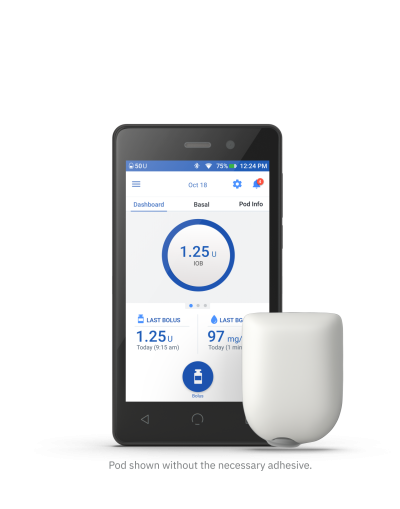Insulet has begun a voluntary recall of the remote-control devices used with its Omnipod Dash insulin pumps after discovering that the devices’ batteries may be at risk of swelling, leaking or overheating with extended use.
The Omnipod Dash is a more pared-down insulin delivery system than Insulet’s Omnipod 5 device. Though it, too, is completely tubeless, waterproof and able to provide up to three days’ worth of nonstop insulin delivery, unlike the Omnipod 5, the Dash pump doesn’t integrate with continuous glucose monitors for automated diabetes management nor can it connect to a user’s own smartphone for wireless control.
Instead, Dash users must rely on the smartphonelike Personal Diabetes Manager (PDM), which comes free with their first shipment of Dash insulin pods. The touchscreen device connects wirelessly to the pods to send updated dosage instructions based on mealtime calculations and separate glucose readings.

The battery in that remote control is the source of Insulet’s urgent medical device correction, which the company published Monday.
According to a letter sent to customers, an unspecified number of Dash users have reported issues with the PDM battery. It may swell in size, leak fluid or experience “extreme overheating,” the last of which has occurred only in “rare cases,” per Insulet, but can pose a fire hazard. To date, Insulet said it hasn’t received any reports of injuries linked to the battery issues.
After investigating the situation, the company has concluded that batteries that have been used for more than 18 months may be at an increased risk, as are PDM batteries that are charged to full capacity, especially if they’re left to charge overnight or for other long periods of time.
To lessen that risk, Dash users should stop charging their PDMs once the battery reaches 85%. The remote shouldn’t be used while it’s charging, and it should be immediately unplugged if it becomes “unusually warm to the touch” while charging.
Insulet also recommends that users examine the remotes for signs of bulging, damage, leakage or any other deformities, and stop using the devices immediately if any are found. They can request a temporary PDM replacement and, in the meantime, switch to the backup diabetes management plan they’ve previously established with a healthcare provider.
For its part, Insulet is planning on replacing all Omnipod Dash PDMs regardless of whether any issues have been reported and including the temporary replacements sent out as a result of the recall. The company said it’s aiming to begin shipping out the updated devices “in the coming months.”
Because of that global replacement effort, Insulet is expecting to incur charges between $35 million and $45 million. According to an Oct. 17 filing with the U.S. Securities and Exchange Commission, those costs will have the greatest effect on its third-quarter cost of revenue, with additional, smaller impacts expected to show up in its operating expenses for the fourth quarter of this year and 2023 as a whole.